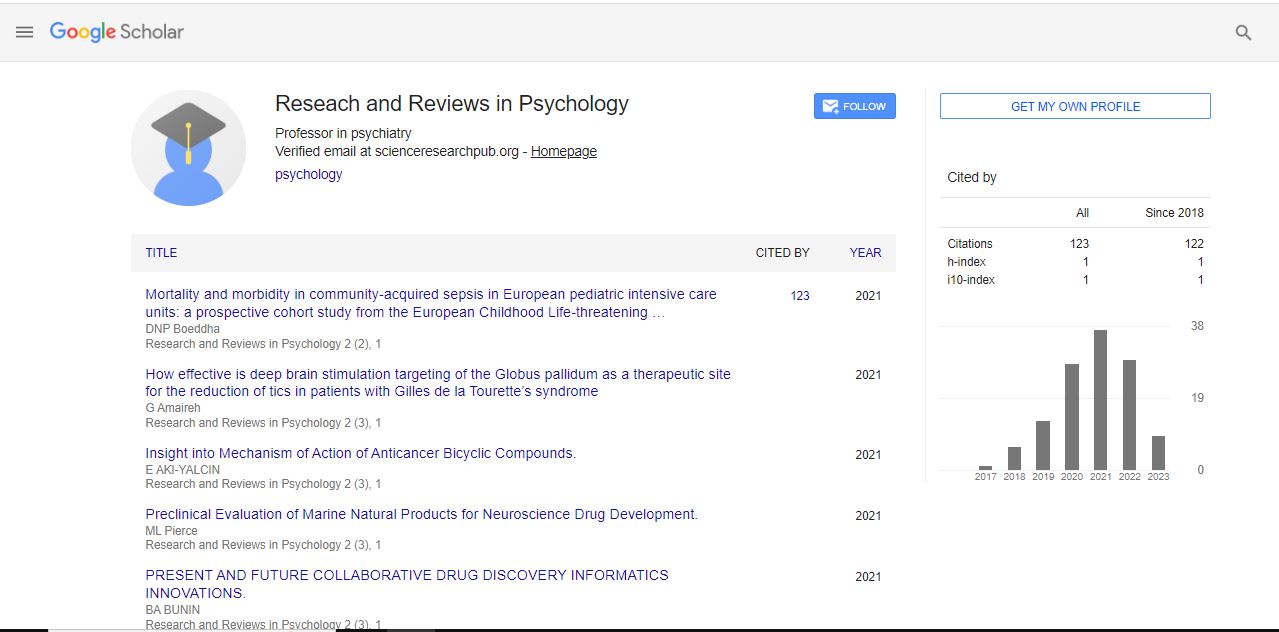Perspective, Res Rev Phys Vol: 4 Issue: 4
Diagnosing the Mind: Clinical Assessment in Practice
Alice Luca*
1Department of Renal Medicine, Australian National University, Canberra, Australia
*Corresponding Author: Alice Luca,
Department of Renal Medicine, Australian National University, Canberra, Australia
E-mail: luca.alice@anu.edu.au
Received date: 28 November, 2023, Manuscript No. RRPY-23-124310;
Editor assigned date: 30 November, 2023, Pre QC No. RRPY-23-124310 (PQ);
Reviewed date: 15 December, 2023, QC No. RRPY-23-124310;
Revised date: 22 December, 2023, Manuscript No. RRPY-23-124310 (R);
Published date: 29 December, 2023, DOI: 10.4182/rrpy.1000353
Citation: Luca A (2023) Diagnosing the Mind: Clinical Assessment in Practice. Res Rev Phys 4:4.
Description
The process of diagnosing mental health conditions is a complex and nuanced endeavor that lies at the heart of clinical psychology. "Diagnosing the Mind: Clinical Assessment in Practice" delves into the multifaceted landscape of clinical assessment, exploring the methodologies, tools, and ethical considerations involved in understanding and categorizing mental health disorders. intricate terrain of the human psyche to provide accurate diagnoses and inform effective treatment strategies.
Clinical interviews are a cornerstone of assessment. Clinicians engage in structured conversations to gather information about the individual's history, presenting concerns, and subjective experiences. The rapport established during interviews is crucial for creating a safe and open space for disclosure. Psychological tests offer standardized measures to assess cognitive, emotional, and behavioral functioning. These tests, ranging from personality assessments to intelligence tests, provide quantifiable data that contribute to a comprehensive understanding of an individual's psychological profile. The Diagnostic and Statistical Manual of Mental Disorders (DSM) is a widely used classification system in clinical assessment. It provides criteria for diagnosing mental health disorders, offering a standardized language that facilitates communication among clinicians and ensures consistency in diagnosis.
The DSM, in previous editions, utilized a multiaxial system that considered different aspects of an individual's functioning, including clinical syndromes, personality disorders, and psychosocial stressors. While later editions have transitioned away from this system, the holistic approach emphasized the interplay of various factors in diagnosis. Cultural competence is a critical consideration in clinical assessment. The interpretation of symptoms and expressions of distress can vary across cultures. Clinicians must be attuned to cultural nuances to avoid misdiagnosis and ensure that assessments are culturally sensitive and relevant.
The presence of comorbid conditions-two or more coexisting mental health disorders-poses a challenge in diagnosis. Clinicians must navigate the complexities of overlapping symptoms and tailor assessments to disentangle the distinct features of each condition, ensuring accurate diagnosis and targeted treatment. Informed consent is a foundational ethical principle in clinical assessment. Individuals have the right to be fully informed about the purpose, procedures, and potential risks or benefits of assessments. Clinicians must obtain consent before initiating any assessment process. Maintaining confidentiality is paramount in clinical assessment. Clinicians adhere to strict confidentiality standards, ensuring that information disclosed during assessments is protected. Clear communication about the limits of confidentiality helps build trust between clinicians and clients.
Self-report measures, such as questionnaires and scales, allow individuals to provide subjective information about their experiences. These measures are valuable in capturing the individual's perspective, shedding light on subjective distress, and tracking changes over time. Objective observations involve the clinician's direct assessment of an individual's behavior, appearance, and interactions. Observations provide valuable insights into non-verbal cues and external manifestations of psychological distress, contributing to a more comprehensive assessment. Assessing mental health in children and adolescents requires specialized approaches. Developmental considerations, such as age-appropriate language and play-based assessments, are incorporated to understand the unique challenges and strengths of young individuals. Assessment in older adults considers age-related factors, including cognitive decline and physical health. Geriatric assessments aim to distinguish between normal aging processes and potential mental health concerns, ensuring accurate diagnosis and tailored interventions. Collaboration is essential in clinical assessment, particularly when addressing complex cases. Interdisciplinary collaboration involves consulting with professionals from different fields, such as psychiatry, social work, or neuropsychology, to gain a holistic understanding of an individual's needs.
Understanding the individual within the context of their family and larger systems is crucial. Family assessments explore relational dynamics and support systems, providing valuable information for treatment planning and interventions that consider the broader social context. Clinical assessment is not a one-time event but rather an ongoing process. As individuals progress in therapy or experience changes in life circumstances, clinicians continually reassess to track changes in symptoms, adjust treatment plans, and ensure that interventions remain relevant and effective. Feedback and collaboration with clients are integral components of ethical assessment practices. Clinicians engage clients in a collaborative dialogue, involving them in the assessment process, discussing findings, and incorporating their insights into the diagnostic formulation.
This perspective encapsulates the intricate journey clinicians undertake to understand the complexities of mental health. From structured interviews and psychological testing to navigating cultural nuances and ethical considerations, clinical assessment stands as a dynamic and evolving process. It is a testament to the commitment of clinicians to provide accurate diagnoses, inform personalized treatment plans, and support individuals on their paths toward mental health and well-being. In the ever-evolving landscape of clinical psychology, the art and science of assessment continue to shape the field, ensuring that individuals receive comprehensive and compassionate care tailored to their unique psychological landscapes.
 Spanish
Spanish  Chinese
Chinese  Russian
Russian  German
German  French
French  Japanese
Japanese  Portuguese
Portuguese  Hindi
Hindi 